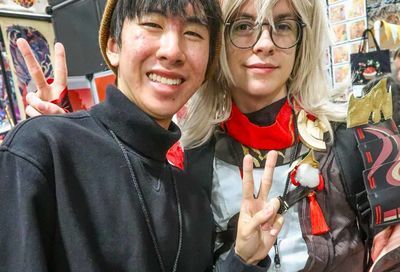Sadie Ryanne Vashti
The Next Generation Awards 2011
It was just before Christmas of last year that Sadie Ryanne Vashti sent an email to her mother asking if she could return home to see her younger brothers and sisters.
As Vashti expected, the answer was no.

Sadie Ryanne Vashti
(Photo by Todd Franson)
”That was so hard for me because I love my siblings and hearing…that I was a threat to them was really hard,” she says.
The last time Vashti, 24, had gone home to southern West Virginia for Christmas she says she suffered a panic attack after her parents, who are Evangelical Christians, reacted in dismay to her declaration that she was a woman, no longer a boy.
”They still would not let me come into their home,” Vashti says of her mother and stepfather, ”but they actually drove to D.C. to have dinner with me and try to talk it out.
”It did not go well.”
Unable to see eye to eye, Vashti’s parents ultimately left without reconciling with their daughter.
”At that point, I wrote them another letter and told them: ‘You disowned me two years ago and I was still trying to make it work, I’m disowning you now.’
”They’ve been psychologically abusive to me my whole life. Why am I even trying? I gave up on them.”
Vashti has instead built a new family – her chosen family – here in Washington over the past few years. She’s polyamorous, involved in multiple serious relationships, and also married to Diana Maria Vashti since 2009. She plans on legalizing the union to her wife, who is also a trans woman, this August with a marriage license.
”I still have dreams about my siblings. I think about them and get sad. But I’ve built the support that I need.”
Among D.C.’s LGBT community, Vashti is prominent for the work that she has done as a member of the D.C. Trans Coalition (DCTC) regarding the Department of Corrections and efforts to improve conditions for transgender inmates in D.C. jails. The Gay and Lesbian Activists Alliance (GLAA) hailed DCTC’s efforts on that front with the Distinguished Service Award in 2009.
She’s also served as a client advocate with Helping Individual Prostitutes Survive (HIPS), where she developed a program for trans women arrested for prostitution-related crimes, helping them re-assimilate after incarceration.
In 2010 Vashti’s activism won her Capital Trans Pride’s Engendered Spirit Award. Now, her work has garnered her a Metro Weekly Next Generation Award.
Given her full schedule of activist work and goals, when she has free time, Vashti likes to attend ”hardcore” concerts.
”It’s faster, heavier, punk-rock music that was actually invented in D.C. in the ’80s,” she says, adding that she occasionally plays bass.
The road to Washington was not an easy one for Vashti. Her story is one of survival, experiencing homelessness, and overcoming physical and mental abuse before ending up in Montreal, where she first developed her trans-advocacy roots.
That journey began back home in West Virginia, where growing up Vashti identified as a ”bisexual femme boy,” having no knowledge of transgender people.
She attended Marshall University in Huntington, W.Va., on an academic scholarship and was housed in the male dorms, where she says she was threatened and sexually assaulted.
”I was actually raped while I lived there, by a boy who lived on my floor,” Vashti says. ”I didn’t report it. I didn’t even tell anyone about it for four years. I just pretended like it never happened. Now I’m fine talking about it, but for a long time I couldn’t even bring it up.”
Vashti dropped out of school and decided to move to San Francisco.
”I would stop if I could find a job,” she says of her trip west. ”All my food, I either shoplifted or I ‘dumpster dived.’ I got a lot of my food out of the trash. I stole drugs to support myself. I didn’t do very much sex work when I first started out – I was too scared – but I did eventually do a lot of sex work. It was mostly about survival at that point.”
Vashti says she did have some brief exposure to the transgender community back in West Virginia – specifically a trans woman who was an environmental activist – but adds that her day-to-day existence didn’t allow the luxury of exploring her community in a meaningful way.
”Being homeless just kind of put all of that on hold. It was about surviving. I coped by drinking and doing lots of drugs.”
Somehow, she was able to overcome her substance abuse problems, ending up in Montreal where she got involved with trans advocacy at 19. She stayed there until she was 21.
”That’s where I met my first trans communities and got involved in trans activism and that’s when I decided to finally transition.”
But, denied residency in Montreal, Vashti was an undocumented worker, taking on jobs such as janitor and fruit picker for illegally low wages. Those conditions drove her back to the U.S.
When considering where to settle back in her home country, Vashti says she came across the work of DCTC and the organization’s campaign to improve conditions in D.C. jails.
”I heard about the work that they were doing and I remember thinking it was awesome and I wanted to get involved in that,” she says. ”So when I moved here, I did. I just showed up at a meeting and they thrust me right into it. And I ended up working on that campaign for a couple of years. And here we are.”
And despite the hurt that remains from being rejected by her parents, Vashti looks back at her life and finds a positive side to the story.
”I often say that while I’m not glad that my family disowned me, it did kind of force me to live,” she says. ”I’m only 24 and I feel like I’ve been more places and seen more things than most people do in a lifetime. So I guess I kind of owe my parents for disowning me.”

Support Metro Weekly’s Journalism
These are challenging times for news organizations. And yet it’s crucial we stay active and provide vital resources and information to both our local readers and the world. So won’t you please take a moment and consider supporting Metro Weekly with a membership? For as little as $5 a month, you can help ensure Metro Weekly magazine and MetroWeekly.com remain free, viable resources as we provide the best, most diverse, culturally-resonant LGBTQ coverage in both the D.C. region and around the world. Memberships come with exclusive perks and discounts, your own personal digital delivery of each week’s magazine (and an archive), access to our Member's Lounge when it launches this fall, and exclusive members-only items like Metro Weekly Membership Mugs and Tote Bags! Check out all our membership levels here and please join us today!


















